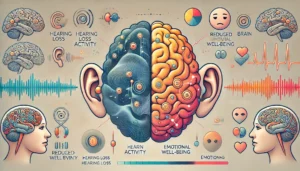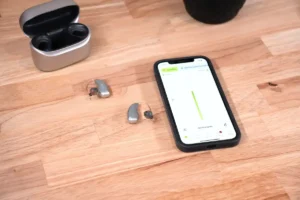How Relationships and Mental Health Are Affected by Hearing Loss

Imagine being in a social setting with loved ones, yet feeling alone because you are unable to participate fully in the conversation. Losing your hearing isn’t just about missing sounds. It’s about losing connection, understanding, and feeling good inside. When hearing slips away, it’s not just about not being able to hear. It messes up friendships, sends your confidence down the drain, and makes stuff like depression way more likely.
We’re going to dig into the overlooked stuff that happens when someone can’t hear well. It’s a big deal for social life and how we feel. If it’s you or someone close to you that’s dealing with this peeling back the layers to understand and finding ways to handle it can give you some serious aha moments. Recognizing all the things this issue touches is your starting block.
1. When You Can’t Hear: Your Head Space

a. The Emotional Shifts With Less Auditory Ability
- Hearing impairments affect feelings and daily life in not so obvious ways:
- Folks with hearing issues and those around them feel frustration during conversations as trying to keep pace becomes tough.
- Feeling shamed or awkward kicks in when you have to ask people to repeat themselves or if you get the wrong idea of what they said.
- Not being able to join in at social gatherings can lead to feeling left out sparking lonesomeness.
- These emotional reactions last more than a moment. Without attention, they may harm one’s mental toughness and life happiness putting strain on relationships and resources.
b. The Link Between Auditory Loss, The Blues, and Worry
Untreated hearing loss has a strong influence on anxiety and sadness. Why, you ask? Well here’s a quick rundown:
- Stress: Trying hard to decode sounds or speech leads to constant tiredness.
- Low Confidence: Relying on others to fill in communication blanks can knock down confidence and self-sufficiency.
- Shying Away from People: When you’re scared of getting things wrong, you might just start dodging interactions, and that can spin into a loop of feeling blue and isolated.
c. Brain Function Suffers From Hearing Loss
Your brain has to change when you have hearing loss—it starts using up stuff it needs for important thinking tasks.
- This change ups the odds for memory slips.
- It’s harder to think clear and stay sharp.
- Things like dementia are part of cognitive troubles that might show up.
Grasping these tough spots shows why we got to catch them and get some pro advice to cut down on the lasting trouble.
2. How Hearing Loss Messes with Relationships

a. Chatting Gets Tricky
- Being able to talk is pretty much the glue for tight bonds. When folks can’t hear well, it spikes up misunderstandings, gets folks riled up, and can spark some serious squabbles.
- In a bunch of people, those with hearing issues might feel pretty useless and kind of on the fringe.
b. Feels Gap in Relationships
- If chit-chat starts tanking, the feel-good connection starts fading and folks might end up feeling all lonely or like they’re getting the cold shoulder.
- People who keep losing their cool, like buddies and fam, can get to a point where they just can’t be bothered to make the effort anymore.
c. Household Roles Get All Shuffled
- When someone’s ears aren’t up to snuff, it can shake up who does what at home or in the squad, and that can lead to more headaches and heartaches.
- Relationships often shift when someone has hearing loss; different family roles emerge leading to tension and arguments.
- It’s common for youngsters to step in and help with communication, which can shake up the normal family vibe and increase stress.
- By grasping these shifts, families and their members can begin efforts to keep peace and stay tight-knit.
3. Solutions to the Hearing Loss Hurdle

a. The Importance of Acting Early
- Nipping hearing issues in the bud prevents them from blowing up into bigger woes:
- Regular Check-Ups: Catching things makes zippy solutions a reality.
- Expert Advice: Whether they’re pushing for new kinds of treatment or suggesting hearing devices hearing pros give advice that’s tailored just for you.
b. Enhancing Hearing through Tech
Modern tech is causing a revolution in how we tackle hearing problems:
- Smart hearing devices sync with phones so you can tweak settings and amp up sound quality with ease.
- Helpful Gear: Things like speech-to-text apps and louder phones are knocking down talk barriers and building confidence.
c. Simple Methods to Boost Chats
- Solid chats benefit all involved. Minor tweaks can have major effects:
- Share your requirements with folks who have trouble hearing to encourage understanding and patience.
- Look right at talkers to make lip reading a handy visual hint.
- For Buddies and Kin: Hold eye contact and use a soft clear voice.
- Dodge shouting; better to give tricky words another go.
d. Cheers from the Crowd
- Support from others makes coping with hearing loss feel less lonely:
- Search for local or online groups to connect with folks who get what you’re going through.
- Show your friends the ropes on hearing challenges to tighten your crew and get each other better.
e. The Perks of Seeking Assistance
- Experts offer counsel to manage troubles linked to emotions and relationships:
- Personal Guidance: Offers strategies to manage sad or angry moments.
- Partner Support Sessions: Offer ways to bring back the close feelings and make talking to each other better.
4. Knowing Stuff

a. Changing How We See Hearing Problems
The shame linked with hearing loss might stop people from seeking help. If we treat hearing aids and other treatments as normal, it encourages folks to get help without feeling bad. Let’s work to make spaces where everybody is valued.
b. Helping Folks Get the Hang of Hearing Loss
The shame linked with hearing loss might stop people from seeking help. If we treat hearing aids and other treatments as normal, it encourages folks to get help without feeling bad. Let’s work to make spaces where everybody is valued.
5. Cool Tech for Hearing Issues

a. Smart Ear Gadgets
- Today’s hearing aids aren’t just for making sounds louder:
- Gizmos with Bluetooth can link up easy with phones making it simple to enjoy tunes or talk on the phone.
- And batteries that you can recharge mean you aren’t got to stress about them dying on you after a short while.
b. The Role of Cochlear Implants
- Hope arises from cochlear implants for severe hearing loss:
- By skipping over broken parts of the ear, these devices bring back the experience of sound.
- They upgrade communication and life quality.
c. Tech Steps Up for Better Hearing
- Other gadgets aim to boost hearing beyond what hearing aids offer:
- Live subtitles polish the clarity of video chats.
- Headphone functions and apps cut down on noise making listening chill.
Last Idea: Don’t Delay

Hearing loss doesn’t have to shape your life or who you hang with. Cool gadgets quick moves, and your crew cheering you on can help you jump over hurdles, tie up loose ends, and get back the joy of having real talks. Jumping on the problem not just helps you feel sure of yourself again, but it also tightens the bonds that matter most.
To get back in tune with the sounds and folks that brighten your day, don’t just sit there—book a hearing check like now. Making your ears a top thing might just fix friendships, pump up your self-esteem, and lead you to a chiller, way happier tomorrow.
